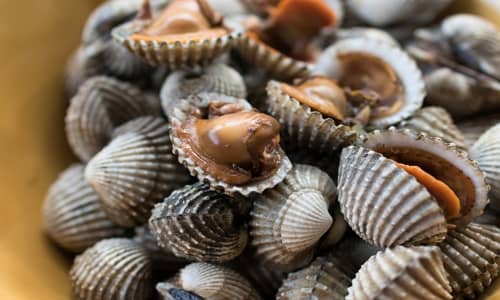Cockles in season, benefits, how to boil them, and how to use
Cockle Nutrition

| Cockle (100g) Nutrition | |||
| Carbohydrate | Protein | Fat | Calories |
| 8g | 9g | 5g | 82kcal |
| Main Nutrition | taurine, betaine | ||
| Main Benefits | Relieves fatigue, prevents aging, and relieves anemia | ||
| Side Effects | Beware of allergic reactions to fish and shellfish; spoiled cockles can cause food poisoning. | ||
Cockles are clams that belong to the clam family. It is mainly found in tidal flat areas, has wavy patterns on the surface, and is shaped like a round fan. The summer season (July to September) is the spawning season, but the winter season (November to March) is the season. It is popular as a health food because it is rich in amino acids and proteins. It has a chewy texture and is generally eaten lightly cooked rather than raw. In addition, it can be eaten in a variety of ways, such as mixing it with seasoning and rice to make bibimbap, or adding it to soup.
2. Cockle Benefits

1. Blood vessel Health
Cockles contain ingredients called taurine and betaine. These two ingredients are a type of amino acid and help maintain blood vessel health. Taurine is effective in lowering the level of harmful cholesterol in the blood. It also prevents the blood from solidifying and preventing the formation of blood clots. Betaine helps lower blood pressure and is effective in preventing cardiovascular diseases such as high blood pressure. Therefore, consuming cockles can help prevent various cardiovascular diseases.
2. Fatigue recovery
Consuming cockles can help relieve fatigue. This is thanks to the taurine content contained in cockles. Taurine is a type of amino acid that helps reduce muscle damage and fatigue during exercise. This is effective in recovering from fatigue after exercise. It also helps produce energy in the body and promotes metabolism. This helps relieve fatigue and recover from fatigue. In addition to taurine, cockles also contain vitamin B, which is also an effective ingredient in relieving fatigue.
3. Liver Health
The taurine and betaine ingredients contained in cockles help not only blood vessel health but also liver health. First, taurine improves liver function and is effective in recovering liver fatigue caused by alcohol. Additionally, betaine is a detoxifying substance and helps detoxify the liver. It also helps prevent fatty liver disease by preventing fat accumulation in the liver due to alcohol consumption. So, consuming cockles is effective in improving overall liver health.
4. Prevents skin aging
Cockles contain an ingredient called selenium, a type of mineral. Selenium is an ingredient that helps remove free radicals, which are the cause of skin aging. Therefore, it is effective in preventing aging by preventing cell damage due to aging. And cockles contain various vitamins, which also help prevent skin cell aging. Therefore, consuming cockles can prevent skin aging and improve skin health.
5. Weight management
Cockles are low in calories and are a low-calorie food. It is also high in protein and low in fat, so you can consume it without burden when losing weight. Additionally, cockles contain a variety of nutrients, so they are effective in replenishing nutrients that tend to be lacking when dieting. And the taurine contained in cockles also helps generate energy for muscles. Therefore, consuming cockles can not only help you lose weight but also help your muscles.
6. Improving and preventing anemia
Cockles are rich in iron. This helps prevent and improve anemia. Cockles also contain B vitamins and hemoglobin. These two ingredients are also effective in improving anemia. And when you consume cockles, they can help people who already suffer from anemia by helping with hematopoiesis. Therefore, when consumed by menstruating or pregnant women, cockles can supplement iron deficiency and prevent anemia.
3. Cockle How to boil
4. Cockle Reduction method
5. Cockle Side Effect
- Cockles are a type of clam. Therefore, if a person with a shellfish allergy consumes cockles, allergic symptoms may occur.
- Shellfish, including cockles, may contain a toxin called saxitoxin between March and September. Therefore, if you consume cockles during this period, you may experience symptoms such as paralysis.
- Cockles have a cold nature. Therefore, if a person with a cold body consumes too much, symptoms such as abdominal pain or indigestion may appear.